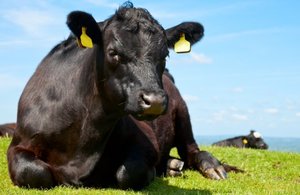Help for businesses seeking to develop diagnostic tests for TB in cattle
News story
APHA to provide free access to samples for commercial development and enhancement of diagnostic tests for bovine tuberculosis (TB)

In its March 2020 response to Professor Sir Charles Godfray’s review of the bovine TB strategy for England, the Government committed to funding the provision of samples to assist with the validation of novel cattle TB diagnostics to OIE standards.
This commitment has now been met, with a limited number of samples available from the Animal and Plant Health Agency (APHA) on a no-cost basis to businesses seeking to further develop their own novel tests for TB in cattle.
These include clinical and pathological samples from different cohorts of cattle, including those with bacteriologically-confirmed bovine TB infection arising from either experimental or natural infections, and those from presumed non-infected animals derived from officially TB free herds in non-endemic areas.
Requests for samples for development and/or enhancement of existing, commercially available tests will be considered. Samples for test discovery and/or research can be requested from APHA Scientific, but will not be free of charge.
Further information is available on the APHA Vet Gateway for businesses who are seeking to further develop their own novel tests for TB in cattle.
Published 24 February 2021